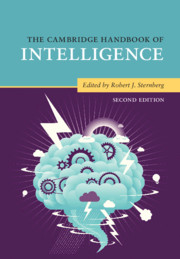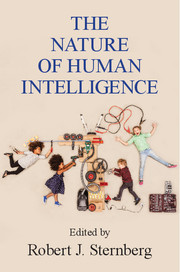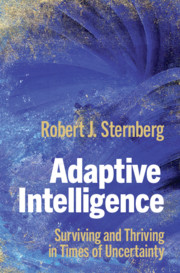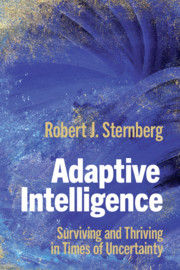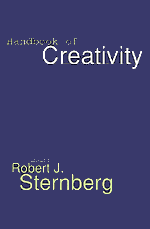The Cambridge Handbook of Intelligence
Written by the foremost experts in human intelligence. It not only includes traditional topics, such as the nature, measurement, and development of intelligence, but also contemporary research into intelligence and video games, collective intelligence, emotional intelligence, and leadership intelligence. In an area of study that has been fraught with ideological differences, this Handbook provides scientifically balanced and objective chapters covering a wide range of topics. It does not shy away from material that historically has been emotionally charged and sometimes covered in biased ways, such as intellectual disability, race and intelligence, culture and intelligence, and intelligence testing. The overview provided by this two-volume set leaves virtually no area of intelligence research uncovered, making it an ideal resource for undergraduates, graduate students, and professionals looking for a refresher or a summary of the new developments.
- Provides a comprehensive historical overview of the field of intelligence and intelligence testing
- Contains new topics not to be found elsewhere, such as intelligence and video games, collective intelligence, leadership intelligence, and the historical evolution of intelligence
- Virtually no area of intelligence research is left untouched
Reviews & endorsements
‘This Handbook is the ultimate collection of chapters needed by everyone who is interested in intelligence. It's exciting to see how the field has developed from the first to the second edition!' Joachim Funke, Ruprecht-Karls-Universität Heidelberg, Germany
‘The definition, scope, and operation of intelligence is central to the field of psychology and no topic has been more controversial. This Handbook, ably edited by Robert J. Sternberg, is comprehensive, authoritative, up-to-date, and admirably balanced.' Howard Gardner, John H. and Elisabeth A. Hobbs Professor of Cognition and Education, Harvard Graduate School of Education
‘Robert J. Sternberg has assembled the ideal people to cover the field of intelligence at the highest level of expertise. This Handbook is destined to remain the definitive source for information about the field for a long time.' Richard E. Nisbett, Theodore M. Newcomb Distinguished University Professor Emeritus, University of Michigan
Product details
April 2020Hardback
9781108485104
1266 pages
260 × 182 × 75 mm
2.63kg
52 b/w illus. 17 tables
Available
Table of Contents
- Part I. Intelligence and its Measurement:
- 1. The concept of intelligence
- 2. A history of research on intelligence part I: pre-twentieth century origins in philosophy
- 3. A history of research on intelligence part II: psychological theory, research, and practice in the nineteenth and twentieth centuries
- 4. An alternative view on the measurement of intelligence and its history
- 5. Factor-analytic models of intelligence
- Part II. Development of Intelligence:
- 6. Genetic bases of intelligence
- 7. Intelligence in infancy
- 8. Intelligence in childhood
- 9. Intelligence in adulthood
- 10. Developing intelligence through instruction
- Part III. Intelligence and Group Differences:
- 11. Intellectual disability
- 12. Prodigies and savants
- 13. Intellectual giftedness
- 14. Sex differences in intelligence
- 15. Racial and ethnic group differences in the United States: multi-cultural perspectives
- 16. Race and intelligence: it's not a black and white issue
- Part IV. Biology of Intelligence:
- 17. Animal intelligence
- 18. The evolution of intelligence: reconstructing the pathway to the human mind
- 19. The biological basis of intelligence
- Part V. Intelligence and Information Processing:
- 20. Basic processes of intelligence
- 21. Working memory and intelligence
- 22. Intelligence and reasoning
- 23. Intelligence and problem solving
- 24. Intelligence and decision making
- 25. Artificial intelligence
- 26. Intelligence and video games
- Part VI. Kinds of Intelligence:
- 27. The theory of multiple intelligences
- 28. The augmented theory of successful intelligence
- 29. Emotional intelligence
- 30. Practical intelligence
- 31. Social intelligence
- 32. Collective intelligence
- 33. Leadership intelligence
- 34. Cultural intelligence
- 35. Mating intelligence
- 36. Consumer and marketer intelligence
- Part VII. Intelligence and its Role in Society:
- 37. Intelligence in worldwide perspective: a twenty-first-century update
- 38. Historical evolution of intelligence
- 39. Secular changes in intelligence: the 'Flynn Effect'
- 40. Society and intelligence
- 41. Environmental effects on intelligence
- Part VIII. Intelligence and Allied Constructs:
- 42. Intelligence and personality
- 43. Intelligence and achievement
- 44. Intelligence and motivation
- 45. Intelligence and creativity
- 46. Intelligence and rationality
- 47. Intelligence and wisdom
- 48. Intelligence and expertise
- Part IX. Folk Conceptions of Intelligence:
- 49. Self- and other-estimates of intelligence
- Part X. Conclusion:
- 50. Speculations on the future of intelligence research.

